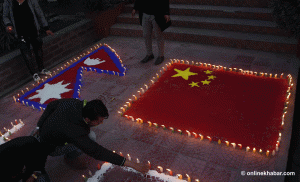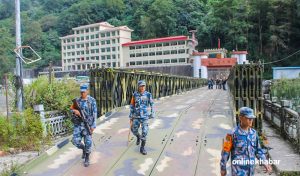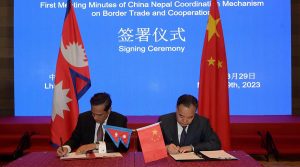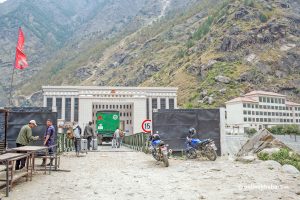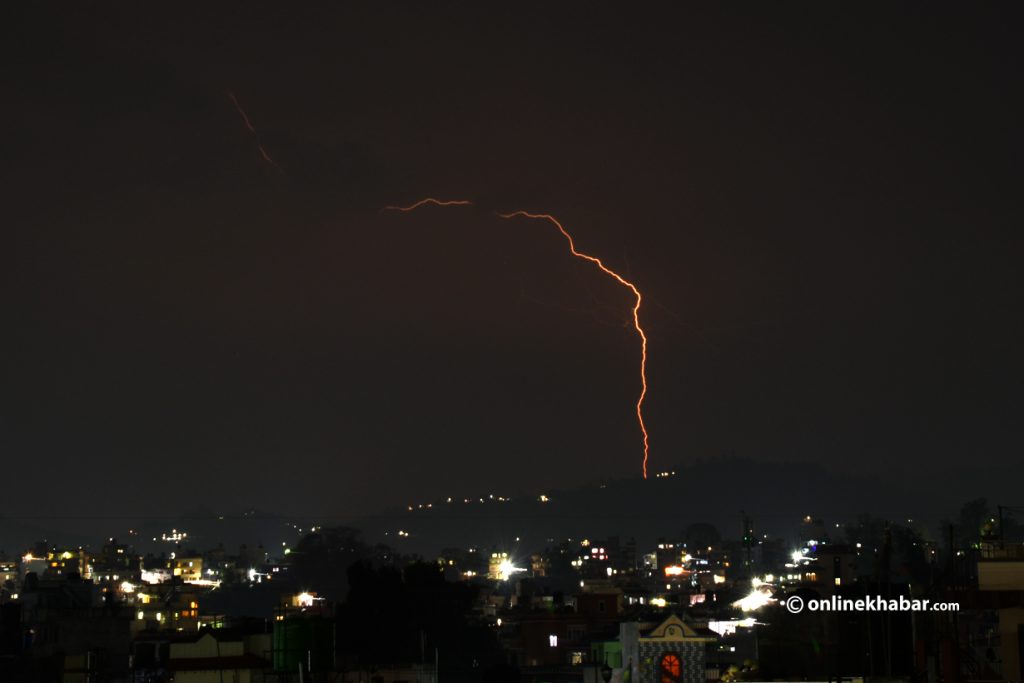Zhan Sheng is currently serving as a non-resident research fellow of the Chengdu Institute of World Affairs of China and honorary expert advisor of the Jeevraj Ashrit Foundation in Nepal. He has published numerous academic articles and political analysis opinions on various influential media in China and abroad. He is also closely following China-Nepal relations.
Onlinekhabar recently talked to him about Nepal-China relations under the Sher Bahadur Deuba government and other bilateral issues.
Excerpts:
How do you see the Nepal-China relations under the new government led by Nepali Congress President Sher Bahadur Deuba?
The political transition of the administrations in Nepal is a domestic affair of Nepal that can never, and should never, be intervened by any foreign states, and China genuinely wishes to improve China-Nepal relations no matter which party or which leader is leading the administration. Back in October 2019, when President Xi Jinping visited Kathmandu, he met Congress Party President Deuba and Xi mentioned two important points: First, the Chinese people would never forget that the Congress Party-led administration made a contribution to China-Nepal relations in history; second, China was serious about improving China-Nepal relations no matter which party rules in Nepal. In July 2021, Chinese Ambassador Hou Yanqi also met and sent sincere congratulations to Prime Minister Deuba. All of those aforementioned gestures show that China never sees the transition of governments in Nepal as somehow an obstacle to bilateral relations and the Chinese willingness to improve the relations with Nepal is sincere and unwavering despite the change of domestic politics.
But, the Belt and Road Initiative (BRI) projects have not moved ahead. What could be the factors behind it?
First, I have to contest the statement that BRI projects have not moved ahead. In fact, they have and the BRI has already been steadily moving forward in the last nine years. For example, according to the data provided by the Chinese Foreign Ministry, Chinese trade with BRI partner countries reached over $960 billion in the first three quarters of 2020, which is 0.8 per cent higher than that of China’s overall trade. Also, a large number of major infrastructure projects have already been completed. For example, the China-Laos Railway tunnel is already finished; the phase 1 project of China-Thailand Railway has already started; the Jakarta-Bandung Railway reached the goal of this stage, and the Orange Line metro train service has started operating in Pakistan. Those are all evidence of the progress of the BRI.
Of course, the challenges are there as well. The most severe challenge to the entire world at this moment is the Covid-19 pandemic, which caused severe obstacles for international travels and international trade between China and the outside world, causing negative impact and inconveniences for Chinese investments abroad. The second challenge is pressure from competitive global powers, for example, the military plan of the Indo-Pacific Strategy of the US which aims to disturb the peaceful construction of China. Third, there are also some non-traditional threats posed by non-state actors, for example, those two recent terrorist attacks targeting Chinese investments in Pakistan.
In Nepal’s case, the BRI is not showing satisfactory results. What could be the reasons?
I am not a specialist in the topics of foreign investments, but I can think of many economic factors causing the relatively unsatisfactory status quo. For example, many infrastructures that China and Nepal are cooperating for such as railways, are quite difficult to operate from an engineering perspective. Also, infrastructure conditions, legal issues, social culture, and various reasons can account for why Chinese private companies often have concerns investing in South Asian countries such as Nepal.
The Covid-19 pandemic also played a huge role. Besides that, there are also a number of political-social factors. First, at the grassroots level, traditional authorities in Nepal sometimes have lots of influence on local issues, and there are also some occasions in which the centre and the local bureaucratic authorities found themselves in different stances with each other and the enforcement of plans are sometimes quite difficult. Besides that, the change of administrations sometimes would radically change the signed agreement of the previous administration, causing discontinuity to economic development and the construction of large infrastructure, as we see in the Budhigandaki hydropower station issue.
My suggestion is that Nepal should first strive to keep the continuity of the economic development issue. Second, of course, the Nepalis understand Nepal much better than foreigners from everywhere in the world, so Nepali specialists and engineers should probably take more of a lead and strive to design more economic, genuine projects with great potential to attract Chinese investments.

Nepal recently formed a government panel to investigate the reported border dispute with China in the Humla district though the earlier government made it clear that there is no dispute with China. What is your view on it?
The China-Nepal boundary has already been settled since 1963, and there is no serious border dispute between the two countries. The norm of international law is that international treaties cannot be automatically changed just because there are elections and transitions of administrations. The report you mentioned argues that there are so-called Chinese constructions on the side of Nepali territory. According to the Purang County officials, the construction was totally on the side of Chinese territory, and the complicated geography on that side makes the distinction of territory sometimes confusing through technical aspects. This year, both the Chinese and the Nepali governments have already conducted several joint investigations on this. The fact is verifiable and it should not be politicised.
Arguably, China always stands in favour of the unification of the communist party of Nepal. But, now, it has shattered into pieces. What is your view on this?
The Communist Party of Nepal has historically made remarkable contributions to China-Nepal relations and of course the party-to-party friendship. The camaraderie between the CPC and CPN naturally prompts China to favour a unified and stable CPN, contributing socialist wisdom into the construction of Nepal. From the view of an outsider scholar, I do feel unfortunate about the current split of the CPN. But, there is nothing that outsiders can help. Only the Nepali communists themselves can introspect and move forward by themselves.
From my understanding, the communist movement in Nepal has this natural tendency of going through the cycles of splitting and unifying ever since the student movement of the 1970s and the people’s movement of the 1990s. This cycle is caused by various factors such as the fractionalised traditional social mechanism, decentralised and multi-centred party organisation systems, prolonged sense of separation caused by two major communist parties’ historical memories, and the existence of various and complicated interest groups and cliques. The NCP unification once temporarily overcame those factors and gave hope for the future, but there was not enough institutionalised system to guarantee the unification, so we see today’s situation happening. Establishing an institutionalised and stable system holding the party organisation together would be a huge mission for Nepali communists in the future.
Many Chinese scholars are saying that Nepal should reject America’s MCC project. What is your view on it?
Yes, I stand firmly along with many Chinese scholars holding the opinion that signing the MCC agreement is not a wise choice. I would like to emphasise that China always wishes to see and to help developing countries achieve economic prosperity, but the MCC is never a purely economic project, but an element of the Indo-Pacific Strategy, which is a US-led military framework aiming to contain and suppress the development of China. The Indo-Pacific Strategy is a sugar-coated bullet, and the MCC, of course, is that sugar-coating around the bullet. To see Nepal, a close neighbour and good friend of China, to join the anti-China IPS framework is indeed harming the feeling of the Chinese people.
It is the domestic issue of Nepal to choose whether to accept the MCC or not, and Nepal’s sovereignty ensures that only Nepal can decide for its own national interest. But, even if we let alone China for a second, is the MCC really good for Nepal? Is it respecting Nepal’s sovereignty? No, it gives American staff’s extraterritoriality on Nepali soil, and as you know, extraterritoriality is one of the most frequent characteristics of colonialism in the 19th century. It deprives Nepali law and court of punishing criminals on Nepali soil, and it basically is saying that the Nepali justice system is not so-called “civilised” enough to legally try foreign personnel on Nepal’s own soil. I really cannot believe that today, in the 21st century, there is still such a blatant unequal treaty insulting the Nepali people.
There is one thing I do not understand: Facing this unequal treaty, my Nepali friends, why are you not angry? Why?

China is seeking Nepal’s support in its position regarding the origin of coronavirus. What are your suggestions to the Nepal government on it?
For the origin of the coronavirus, the WHO has already been conducting very detailed and scientific research works. My understanding is that China is not subjectively asking any countries to support any particular statements on the origin of the coronavirus, but urging the entire world not to weaponise or politicise the origin of the coronavirus. All China wishes is that the entire world can unite together and confront the Covid-19 pandemic, instead of making up conspiracy theories trying to blame geopolitical competitors as somehow the “inventor”, artificially creating the coronavirus.
My suggestion is that the Nepali people, along with people from the rest of the world, just unite together and confront the pandemic. On the origin of the coronavirus, let’s not politicise and weaponise it. We leave this to scientists to research. Let all respect science and truth.
To conclude, what are China’s key interests in Nepal?
China, unlike the other neighbour of Nepal, does not wish to establish any sort of so-called “special relationship” with Nepal and China never wishes to intervene with Nepal’s domestic affairs. China does not seek any political interests in Nepal, and the only and modest demand of China is that Nepal should not be used by anti-China forces as a footstool and a stepping board harming China. The key wish of China in Nepal is that Nepal continues to uphold its one-China policy and not to allow any anti-China forces to use the land of Nepal to attack China.






